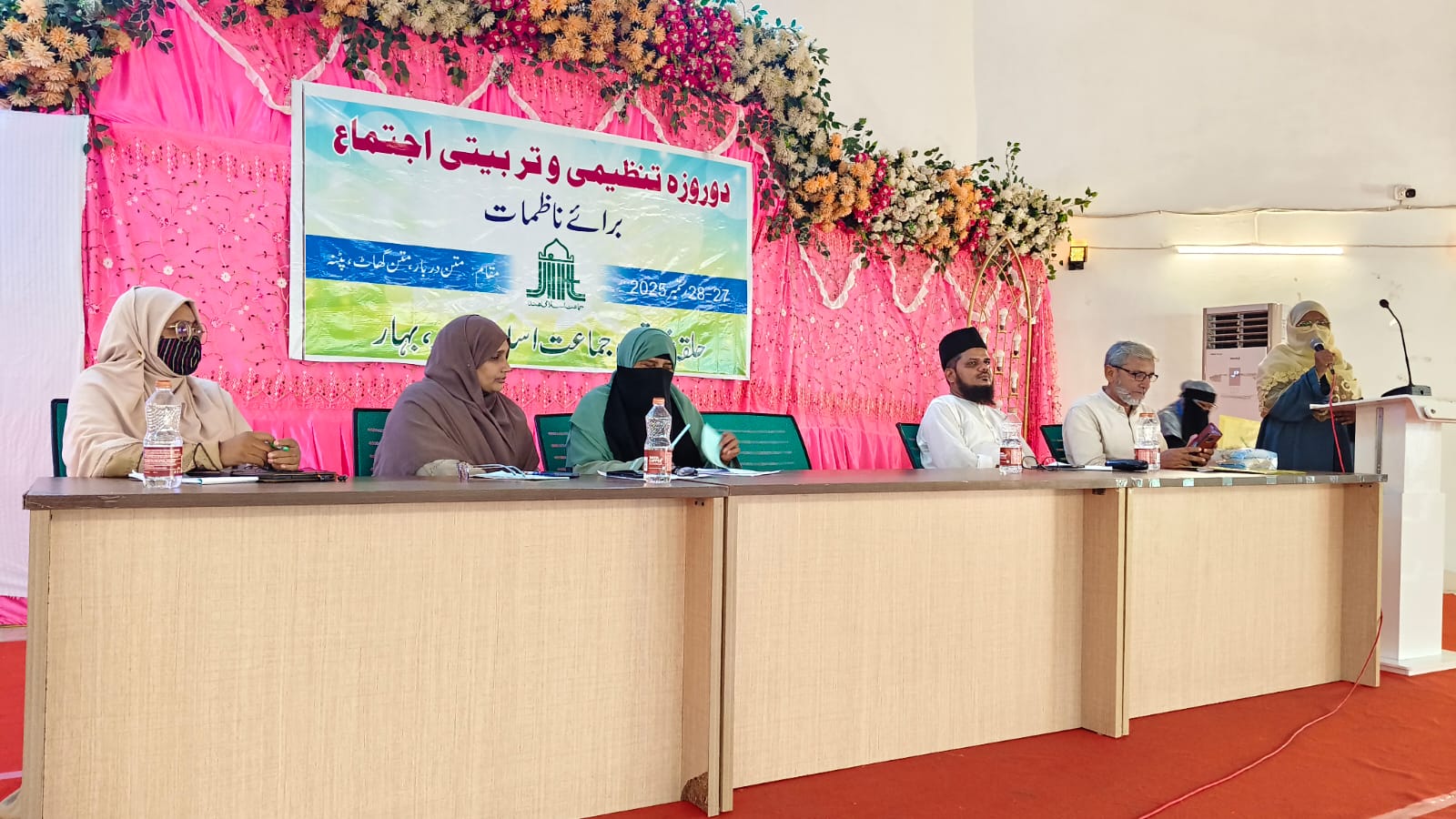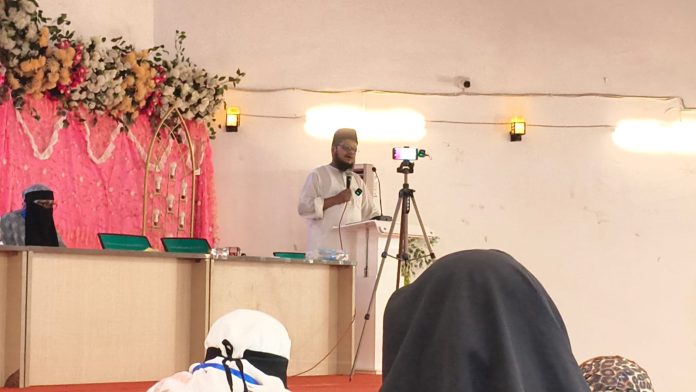– Md. Sami Ahmad
Patna: The Jamaat-e-Islami Hind, Bihar wrapped up its two-day organisational and training programme for State’s women leaders on Sep. 28, emphasising women’s pivotal roles in Islamic movement, the necessity of sacrifice, and the importance of discipline. Held on Sep. 27-28, the event featured workshops, discussions, and motivational sessions aimed at strengthening leadership among women participants from various regions.
In his keynote address on the second day, Maulana Rizwan Ahmad Islahi, Ameer-e-Halqa, who delved deeply into the reasons behind the shortage of members and Nazimat within the organisation, attributed it to a widespread mindset where individuals do not view the work of establishing Deen as their personal responsibility.
He said, “We do not consider this our responsibility but often perceive it as the exclusive duty of prophets, scholars, or men.” He highlighted how this misconception hinders growth.
Turning the pages of Islamic history, Maulana Islahi underscored that women have always been integral to the faith’s advancement. He said the Quranic title of Ummat-e-Wasat, or the balanced nation, applies equally to women as it does to men. Referencing the siege of Shaib Abi Talib, he noted that not only men but also women endured hardships. During the establishment of the Islamic state in Madinah, women played leading roles in providing services. He pointed out that women stood shoulder to shoulder with men in setting up marketplaces, citing the exemplary lives of Hazrat Khadija and Hazrat Aisha as models of dedication and contribution.
 Maulana Islahi also emphasised women’s historical agency in serving Deen alongside men, stating that “history is filled with golden words about how women performed services for the Deen alongside men.” He affirmed their inherent capabilities: “They possess such capabilities and strength that they can eradicate evils and promote virtues in the best manner.” To illustrate this, he invoked the examples of Hazrat Hajra and the actions of the mother and sister of Hazrat Musa, which demonstrated resilience and faith-driven initiative.
Maulana Islahi also emphasised women’s historical agency in serving Deen alongside men, stating that “history is filled with golden words about how women performed services for the Deen alongside men.” He affirmed their inherent capabilities: “They possess such capabilities and strength that they can eradicate evils and promote virtues in the best manner.” To illustrate this, he invoked the examples of Hazrat Hajra and the actions of the mother and sister of Hazrat Musa, which demonstrated resilience and faith-driven initiative.
Maulana Islahi warned that the work of establishing Deen “cannot be accomplished without the spirit of sacrifice and dedication.” He quoted a Qur’anic verse to reinforce this: “You cannot attain righteousness until you spend in the way of Allah from that which you love.” Elaborating, he discussed how beloved possessions – time, resources, or comforts – must be prioritised for the path of truth.
He further highlighted the critical role of organisational discipline, asserting that even with all other qualities, a Jamaat fails without adherence to its structure. “Regularity, steadfastness, mutual cooperation, and team spirit are essential for an organisation,” he said. Citing the Battle of Uhud incident, he explained how the lack of discipline led to adverse outcomes, underscoring the need for unwavering commitment.
Maulana Islahi identified the shortage of individuals as the core issue, compounded by lack of coordination even when people are available. He observed that this problem is particularly evident among women, where deficiencies in harmony, the spirit of listening and obeying, determination, and resolve often obstruct progress toward goals. He attributed such issues to imbalance and one-sidedness.
The event ended with the concluding speech by Shaista Rafat, National Secretary of Jamaat-e-Islami Hind. Quoting the Quranic verse (42:20), she urged participants to apply the lessons learned: “Whoever desires the harvest of the Hereafter, We increase for him his harvest, and whoever desires the harvest of this world, We give him thereof, but he will have no share in the Hereafter.” She warned that the two days of effort would go in vain if the knowledge gained was not translated into practical action.
Mrs. Rafat expressed profound gratitude for divine selection, noting, “It is a great favour of Allah that there are many Muslim women across the length and breadth of India who can do a lot, but Allah has chosen us to carry the flag of this movement.”
She highlighted how Allah has provided opportunities to join the movement, guided participants through various training stages, and elevated them to leadership positions. “We should be grateful to Allah and make the best use of the position He has granted us,” she said. The session ended with a short prayer and expressions of thanks.
Earlier, the morning session featured several key presentations. It began with Tazkir bil Hadith by Munawwar Sultana, a member of Advisory Committee, who beautifully explained the importance of remembrance and supplication through a Hadith.
Rafat also led a workshop on succession planning, drawing from Surah Al-Imran (verse 81) to stress the need to prepare future leaders today, as work often diminishes without forward planning. She described the 21st century as an era of ideas and opportunities, where falsehood is bolstered by expertise while truth is obscured, and lamented the lack of creative and professional skills among the faithful. For establishing Deen, she introduced a 3-S formula: Salihiyat (Righteousness), Salahiyat (Capability), and Salabat (Strength).
Dr. Shahnaz Begum, a member of the Bihar Shura, conducted a workshop on developing leadership qualities, including trustworthiness, justice, benevolence, courage, and competence. She distinguished between mere knowledge from books and true wisdom, which requires deep immersion to uncover insights. Her principles for growth included aligning words with actions, consistent work, monitoring current affairs, adapting to environment, and emotional control.
A discussion on local expansion of work involved inputs from Zeba Aftab (Muzaffarpur), Fatima Parveen (Araria), Maria Basri (Israha), and Shabana Mansoor (Hisua), followed by Shaista Rafat’s presidential remarks.
Special guest Kamayani, a social member, engaged participants with activities on social issues and leadership roles, sharing insightful perspectives.
The afternoon session, moderated by Zeba Aftab, opened with Rabia Basri, Assistant Secretary of Jamaat-e-Islami Hind, presenting on activating the cadre. She outlined three steps: identifying skills, approaching gently, and encouraging with honourable titles, illustrated by examples from the Prophet Muhammad ﷺ and the Sahaba. Stressing that trained workers are effective volunteers, she used a short documentary to convey: “Motivation is temporary, Discipline is permanent.” She advocated selecting tasks based on abilities and maintaining unwavering focus on the organisation’s mission, prioritising quality work over immediate results.




